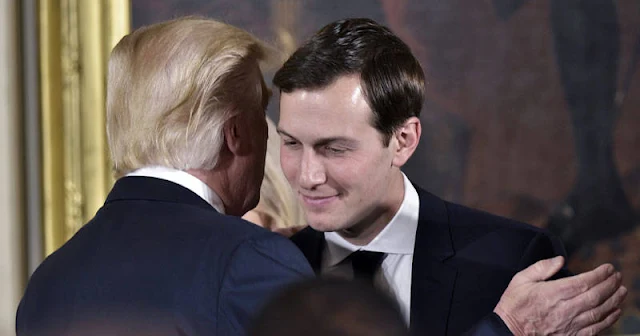Kushner, the powerful husband of Ivanka Trump
The so-called "favorite son of the president" is today the most powerful and influential person in the United States government. The tycoon's son-in-law is an Orthodox Jew and comes from an immigrant family with an impressive history behind it.
Donald Trump is a man who does not usually trust people very much. And perhaps even less after reaching the presidency. Therefore, the role played by those closest to him is decisive. Ivanka and her husband Jared Kushner may be one of the few who truly speak in your ear. She has become the best image of that government. Smart, rich and successful, the daughter of the President of the United States has power and knows how to handle it. He, on the other hand, has one of the most coveted seats in the White House. Many people, and the press, describe him as the most powerful and influential person in the government.
Kushner was gaining that space, long before the possibility of his father-in-law of coming to power began to take off. With no experience in such political struggles, Kushner managed to map out a roadmap for Trump's triumph, using new social media, Facebook and others, and modern marketing tools from the private sector. He transformed the way presidential campaigns were conducted in the United States. From the beginning of the new government, Kushner was appointed as Special Adviser to the President. This is his life and so will his role in the government that has all the eyes of the planet on.
A history of immigrants
The family history of Jared Kushner, Ivanka Trump's husband, is full of drama. He was born 35 years ago in the traditions of Modern Orthodox Judaism, a current that integrates the strict observance of the rules and customs of religion, with secular life. His grandparents come from what is now Belarus, formerly the territory of Poland. When the Nazis invaded the town where they lived in 1941, they savagely persecuted the Jews, they killed the doctors, lawyers and intellectuals of that religion, in the main square, while an orchestra was playing.
Rae, his paternal grandmother, was barely a teenager, and she was one of the women forced to clean up the blood spilled by the victims. After her they interned her in a ghetto that served as a concentration camp. In January of this year, Andrew Rice of the New York Magazine recalled this story of his grandmother, and how he managed to flee, along with other members of his family and hundreds of others, through a tunnel they had dug that led to a forest. where a group of armed Jews had managed to entrench themselves. The Germans discovered the tunnel and began the pursuit, killing several. Rae managed to escape without being hurt. The story of her and that of her companions was taken to the cinema a few years ago.
But her grandmother's hardships didn't end there. Life in the place in the forest where she fled was very hard. Food was scarce and they had to sleep in the open on the ground. Until the Soviets came and liberated them.
After the war, Rae married another ghetto survivor, a carpenter named Yossel. She with him traveled on foot to Italy, where they lived in a camp for illegal immigrants, while they waited for a visa to enter the United States. At that time this country had quotas for the entry of foreigners, based on race and nationality. The quota for the Jews was very low, so they had to wait more than three years. The New York Magazine quotes Rae's words in the book “The Miracle of Life”: “For the Jews the doors were closed. We never understood that. "
Many say today that I hope Jared Kushner remembers Grandma's tragedy, and his words, to convince his father-in-law, President Trump, to take a less harsh and restrictive position in the face of the illegal immigrants he threatens. with extradite. But Kushner's influence on Trump has its limits: it is true that during the campaign Kushner was Trump's main adviser, when it comes to tactics and logistics. He actually became his campaign manager. However, in terms of programs and proposals, his influence seemed to be more limited.
A difficult past
Despite Jared Kushner's softness and good manners, those who know him say he has an iron temper. His painful and difficult experiences have shaped his character. One of those experiences had to do with his father being sent to jail by Charles Kushner, after a confrontation with a brother, for real estate businesses.
Those clashes led to a series of lawsuits that came to the attention of Chris Christie, then the Attorney General of New Jersey. New York Magazine says that, furious with her sister, since he thought she was cooperating with the prosecutor's investigation of her, he sought revenge on her by setting a trap for her husband. He had a prostitute approach him and take him to a motel, where a hidden camera recorded the sex scenes. Kushner Sr. sent the tapes to his own sister, who without hesitation gave them to the Prosecutor. Kushner ended up on trial for several violations of the law. He was convicted and spent nearly two years in an Alabama jail. During that time, Jared and his mother visited him weekly.
After graduating from college, Jared followed in his father's footsteps and went into real estate business, first in New Jersey and then New York. In this sense, he has had a career similar to that of his father-in-law.
Journalist Daniel Golden, in an article late last year in the British daily The Guardian, wondered how a person like Jared Kushner, with a mediocre GPA in high school, managed to get into Harvard University. He investigated that when the boy was beginning to look at colleges, his father had promised Harvard a donation totaling $ 2.5 million, to be awarded in annual transfers over 10 years. According to the journalist, at least 400 donors managed to get their children into this important educational center. This "may suggest that the university weakened its standards for the descendants of its wealthy patrons."
Despite his mediocre grades in high school, Kushner graduated from Harvard with honors. Like Trump, Kushner takes big risks in business and has come close to bankruptcy. He bought a building on Fifth Avenue in New York for $ 1.8 billion that he got financed. However, the economic and real estate crisis came and the value of the leases fell significantly. He crawled to meet his obligations. With few friends to reach out to him, he nevertheless managed to refinance the debt and pay off percentages of the property.
Again, taking risks, at age 25 he bought a weekly The New York Observer. He had no prior journalism experience but was a quick learner. He visited newsrooms and spoke to journalists and editors. He made it a journal, put it on the Internet, and got it out of the way in no time, so that he began to make a profit. He not only wanted money, but to have a voice and influence. He made it.
The New York Magazine reports that Kaplan, the first editor Kushner inherited in the newspaper, said that his favorite novel was "The Count of Monte Cristo," the adventure book that deals with the themes of revenge and reconciliation. The main character is abandoned by his friends, they lock him up in jail but he manages to escape. On a desert island he finds the treasure that his cellmate had buried. Before he passed away he described the place to her. With the money found he returned to exact revenge against his enemies.
Several press commentators, and anonymous voices among Trump's team, claim that Jared Kushner was responsible for his not having finally chosen him as his candidate for vice president. Likewise, it would have led to Christie's humiliating dismissal from the transition team. Kushner denies it. According to The Guardian, Kushner would have declared in this regard: "Six months ago Governor Christie and I decided that this election was much bigger than any difference we could have had in the past, and we work very well together."
Trump recently met again with Christie. We'll see if he offers her a high position in the future and if the Count of Monte Cristo's curse is broken.











